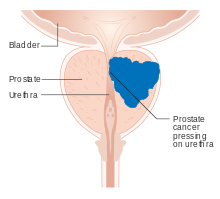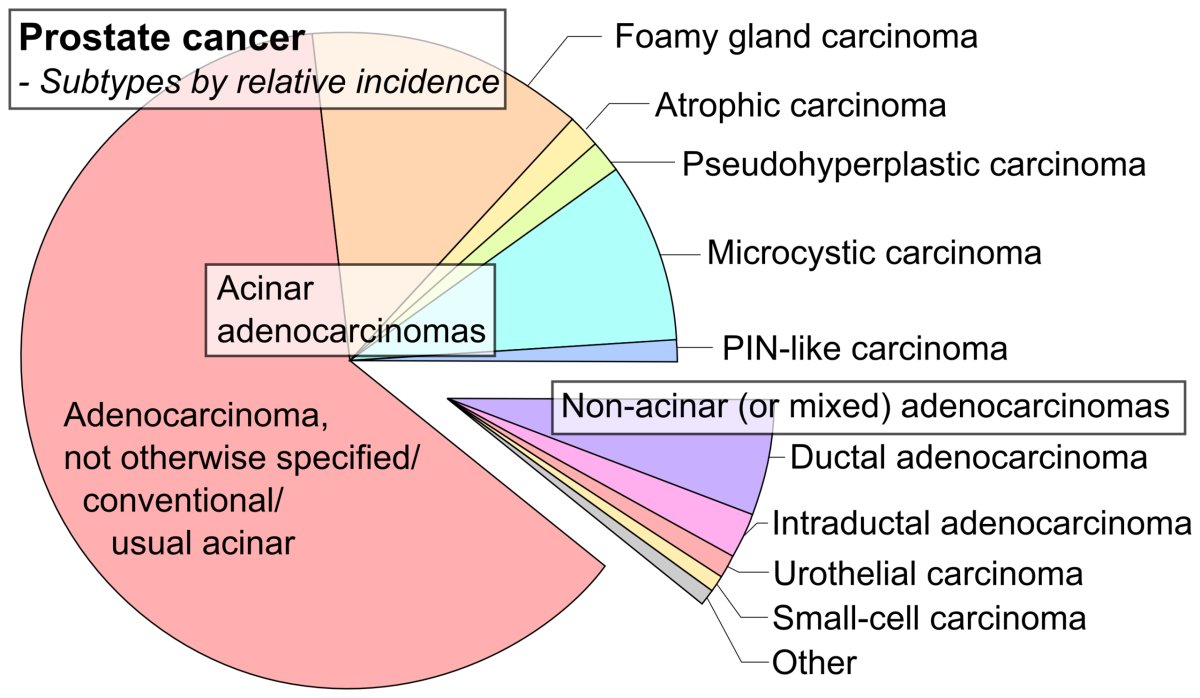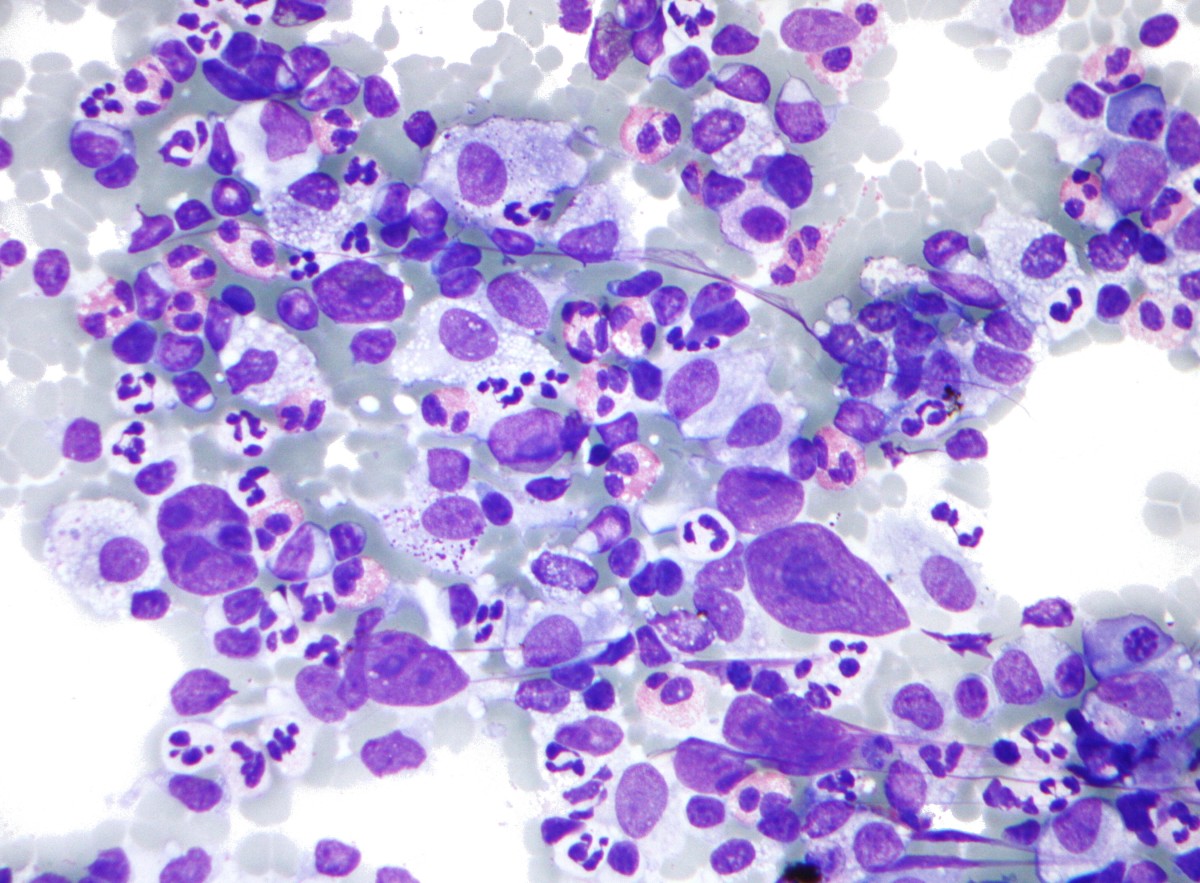Key Information About Prostate Cancer
Prostate cancer is a medical condition that is characterized by uncontrolled, malignant growth of cells in the prostate gland.
It is the second most commonly occurring cancer in men and the fourth most commonly occurring cancer overall.
Charities estimate there are more than 53,000 new cases in the United Kingdom and 280,000 in the United States of America each year.
And 12,000 men die each year from the disease - 33 every day - with almost 35,000 deaths each year in the United States of America.

Causes
The exact cause of prostate cancer is difficult to determine. Autopsy studies show 1 in 3 men over the age of 50 have some cancer cells in the prostate.
It commonly occurs in males aged 65 and above. However, there has been a rise in prostate cancer cases among the younger population in recent times.
Usually multiple factors are involved, including genetics and exposure to environmental toxins.
About 5 to 10 percent of all prostate cancers diagnosed are hereditary. It is most prevalent in black men.
Agent Orange
A research study conducted in the year 2013 at the Portland VA Medical Center and Oregon Health and Science University indicates that exposure to Agent Orange increases the risk of aggressive forms of prostate cancer.
Foods high in saturated fats like those found in meat and dairy increase the risk of prostate cancer.
Findings of a research study published in August 2022 in the American Journal of Clinical Nutrition indicate that drinking milk daily increases the risk of prostate cancer.
Meat Increases the Risk of Prostate Cancer

Foods That Increase Prostate Cancer Risk
Red Meat
|
Processed Meat
|
Alcohol
|
Salad dressings
|
Baked goods
|
Full fat cheeses
|
Symptoms
Difficulty emptying the bladder, blood in the urine, back pain, weak flow while urinating, hip pain, feeling that the bladder is not empty after urinating, pelvis pain, dribbling urine after urinating, blood in the semen, frequent urination during night hours, weight loss, erectile dysfunction and sudden need to urinate are some symptoms of prostate cancer.
One sign of a spreading tumour can appear in your legs as swelling. This swelling occurs when prostate cancer has spread to the lymph nodes, according to Cancer Research UK.
The signs of prostate cancer can often be similar to those of prostate enlargement.
Diagnosis
Most common diagnostic tools are digital rectal exams and blood tests for prostate-specific antigen (PSA).
Introduction of PSA screening has resulted in more than one million additional men being diagnosed and treated for prostate cancer in the USA.
Urologists usually recommend prostate biopsy if results from initial tests, such as a prostate-specific antigen (PSA) blood test or digital rectal exam, suggest the person may have prostate cancer.
A research study published on May 15 2022 in the New England Journal of Medicine Evidence looked at how successful (in diagnosing prostate cancer) the blood tests were for all races, and specifically for Black men, by estimating how often these tests led to overdiagnosis and overtreatment.
The research scientists looked at thirty years of records through 2016, the last year records were available.
Not only was the test more effective than researchers originally thought, the study determined that the net benefit is even better for Black men than for the general population.
One death was prevented for every 11 to 14 men of all races diagnosed with cancer, the study indicated.
Among Black men, the test prevented one death for every 8 to 12 men diagnosed and one death for every 5 to 9 men treated for prostate cancer.
Researchers at Radboud university medical center have developed a "deep learning" system that is better than most pathologists at determining the aggressiveness of prostate cancer.
A test which is now available at UCSF and UCLA, makes cancer cells light up on positron emission tomography (PET) with a radioactive compound developed more than a decade ago in Germany.
Research study conducted in December 2022 from a team of scientists in Italy has reported successful early tests for an electronic nose system designed to sniff out prostate cancer biomarkers in urine.
The technology follows on from earlier research that found trained sniffer dogs can accurately detect prostate cancer.
Electronic nose system includes sensors designed to identify various volatile organic compounds (VOCs) responsible for odors.
In February 2023, research scientists at the University of East Anglia helped develop a blood test to detect prostate cancer with greater accuracy than current methods.
This research showed that the Prostate Screening EpiSwitch (PSE) blood test is 94 per cent accurate - beating the prostate-specific antigen (PSA) blood test.
The test was developed by Oxford Biodynamics in collaboration with UEA, Imperial College London and Imperial College NHS Trust.
An AI model developed for detecting prostate cancer found that its performance was "not different from that of experienced radiologists". A team, including researchers at the Mayo Clinic in Minnesota, US, said as a "potential assistant" to a radiologist, the model could help improve diagnosis from magnetic resonance imaging (MRI) scans through increased detection with fewer false positives. "The interpretation of prostate MRI is difficult. More experienced radiologists tend to have higher diagnostic performance," said Naoki Takahashi from the Department of Radiology at the Mayo Clinic and senior author of the study published in the journal Radiology in August 2024.
Treatment
Prostate cancer can be cured when detected and treated early. Scientists using ultrasound to treat some types of prostate cancer have cured the disease in almost two thirds of cases with minimal side effects.
Abiraterone acetate (Zytiga), Apalutamide (Erleada) and Enzalutamide (Xtandi) are used to treat this disease.
Nubeqa, or darolutamide, is used to treat patients who have got prostate cancer that has not spread but is castration-resistant.
IMRT (Intensity Modulated Radiation Therapy) uses high doses of radiation to kill prostate cancer cells while protecting the healthy cells that surround prostate cancer.
"I had 25 radiation treatments. Then I had to wait five or six months to see if it had done its job. It did," said former footballer Louis van Gaal.
Yoga reduces prostate cancer related tiredness.
Accord BioPharma, the US specialty division of Intas Pharmaceuticals, Ltd. focused on development of oncology, immunology, and critical care therapies, announced on March 31 2022 the US launch of CAMCEVI™ (leuprolide) 42mg injection emulsion for the treatment of advanced prostate cancer in adults.
As cancers grow and spread in the human body, they tend to become more aggressive over time, and this can accelerate during treatment as they develop resistance to drugs. In prostate cancers, some evolve into a rare, treatment-resistant tumor known as a small cell neuroendocrine, or SCN cancer.
TULSA procedure, a minimally invasive treatment using MRI and transurethral ultrasound instead of surgery or radiation is effective in treating prostate cancer, according to new research presented at the Society of Interventional Radiology Annual Scientific Meeting in Salt Lake City in March 2024.
A plant-heavy diet high in fruits and vegetables may stop prostate cancer from getting worse, according to a research study conducted in University of California.
Researchers used an existing cohort of research between 2006 and 2016 to survey 2,000 men with prostate cancer.
“Our findings align with previous reports that plant-based diets may improve prostate cancer outcomes,” the researchers said, as reported by The Times in May 2024.
Do you practice yoga?
- Is Exercise an Effective Treatment for Prostate Cancer? | MedPage Today
A deep dive with Rob Newton, a pioneer in the field of exercise oncology
Prevention
Include Brazil nuts, soy, tomatoes, coffee, broccoli, berries, walnuts, carrots, green tea and pomegranate in your diet.
Adhere to plant-based diet. Do yoga daily. Reduce salt intake. You may use spices and herbs to flavor your food.
A team funded by the World Cancer Research Fund and Cancer Research UK has found that men who exercise daily could halve their risk of prostate cancer.
Given that prostate cancer feeds on testosterone and dihydrotestosterone, there have been multiple large studies trying to lower dihydrotestosterone in men to prevent prostate cancer.
A research study conducted at the University College London in December 2019 claimed that targeted screening aimed at men with a higher genetic risk of prostate cancer could prevent nearly one in six deaths associated with the disease.
According to researchers from the University of California, Los Angeles, Unfold AI, an AI tool, demonstrated an 84 percent accuracy rate in identifying prostate cancer, surpassing the 67 percent accuracy rate achieved by doctors.
Unfold AI is an innovative AI tool developed by Avenda Health and approved by the US Food and Drug Administration.
The program utilizes advanced algorithms to analyze various clinical data types, including pathology, imaging, and biopsy results.
By creating a 3D cancer estimation map, Unfold AI provides a visual representation of the likelihood of cancer presence, helping doctors make more informed decisions.
In a study conducted by UCLA in July 2024, seven urologists and three radiologists tested Unfold AI by analyzing 50 cases where tumors had been removed.
The AI tool demonstrated a significantly higher "negative margin rate," indicating a reduced likelihood of residual cancer post-surgery.
Coffee Reduces Prostate Cancer Risk

Celebrities With Prostate Cancer
In May 2024, renowned saxophonist David Sanborn, winner of six Grammy Awards, died after a prolonged battle with prostate cancer, at the age of 78.
Actor, comedian, producer, director and writer Ben Stiller was only 48 when he was diagnosed with prostate cancer in 2014.
Actor Robert De Niro was diagnosed with prostate cancer in 2003.
English actor Roger Moore was diagnosed with prostate cancer in 1993, and had surgery to remove his prostate.
Roger Moore

This content is accurate and true to the best of the author’s knowledge and does not substitute for diagnosis, prognosis, treatment, prescription, and/or dietary advice from a licensed health professional. Drugs, supplements, and natural remedies may have dangerous side effects. If pregnant or nursing, consult with a qualified provider on an individual basis. Seek immediate help if you are experiencing a medical emergency.
© 2019 Srikanth R








